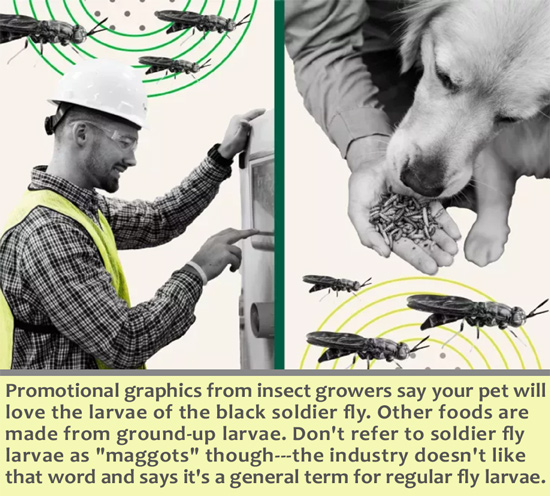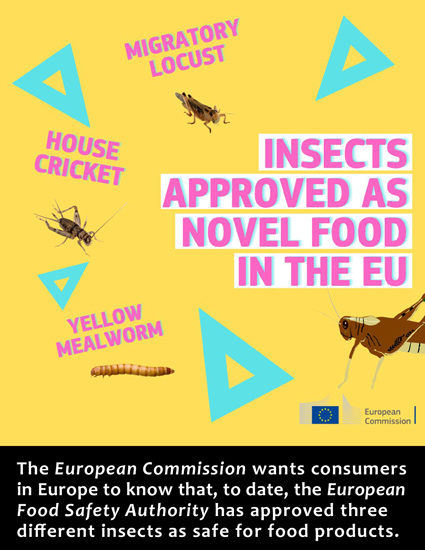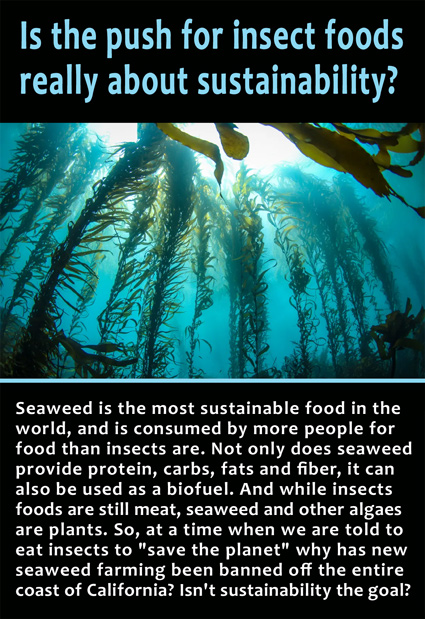With the announcement by food giant Tyson Foods that they are investing in the “insect protein” business, it appears America is a step closer to incorporating bugs into its food supply.
The big question is, will we be aware of it when it happens?
Becoming unwitting consumers of insects is not out of the realm of possibility. After all, the U.S. Food & Drug Administration allows all kinds of questionable additives and fillers in foods without specifically listing them on the label—provided said additives are kept under certain amounts.
Moreover, Big Ag has a lot of sway over regulators. They successfully lobbied to have country-of-origin labels removed from U.S. meat products in 2015.
To this day American consumers buy millions of pounds of meat each day without any knowledge of which country the meat came from. Who’s to say “insect meat” producers won’t ultimately succeed in being shielded from similar consumer awareness labeling?
Background
The insect narrative is not new. “To save the world, eat bugs” proclaimed a headline in The Atlantic in 2014.
The article then proceeds to explain: “Two billion people worldwide already eat 1,900 insect species. The United Nations hopes that one day Americans will, too. What would it take for that to happen?”
For the skeptic, making it happen will involve overcoming two profound roadblocks: a stomaching-churning taste and a questionable nutritional claim.
Very few people think bugs taste good, period. That’s why most of the marketing for insects involves turning them into a powder—and then hiding the powder in other foods.
As for the suggestion that two bilion people already acquire adequate nutrition eating insects, the poplulations in these countries can hardly boast about their health and longevity. They are still susceptible to common infectious diseases like malaria and tuberculosis.
While eating bugs may not be the direct cause of the diseases, one of the reasons experts give for the high rate of disease in these countries is lack of nutrition. So, it will be a difficult sale to convince Westerners that these struggling populations are benefitting from their insect diets.
A third reason it will be difficult to get people to eat insects is skepticism around the entire premise for why it needs to be done in the first place: that global food shortages are inevitable due to climate change.
We’ve been down the “global starvation” road before, including in the 1950s and 1970s.
Every time the dire predictions turned out to be false—thanks in large part to improvements in farming technology.
Regardless of these facts, a number of entities appear determined to make insect-eating common place.
These groups include the World Economic Forum, the European Union, a few powerful billionaires, and supposed “environmental” groups that claim to own the science on climate change and protein production.
Insect narrative gains steam
In January 2020 the narrative of eating bugs to save the world was gaining momentum, and even included a precise doomsday year. “Get ready to eat bugs if you want to live beyond 2050” lectured headlines across the Internet.
Later in the year NutriNews.com updated consumers on just what kind of bugs we’d be eating to avoid the 2050 doomsday deadline: “So far, house fly (Musca domestica), yellow mealworm (Tenebrio monitos), and black soldier fly (Hermetia Illucens) have been singled out as having the greatest potential to become industrialized.”
Following in lock-step, in early 2021 the European Food Safety Authority (EFSA) declared that yellow mealworms would indeed be the first insect they were ruling safe for human consumption.
According to The Guardian, this ruling would allow “mealworm finger foods, smoothies, biscuits, pasta and burgers” to be mass produced across Europe.
Later in 2021 “migrating locusts” were added to the EU’s approved list of novel foods. Today, with the addition of regular house crickets, the EU’s approved list stands at three types of insects.
This is a significant milestone in Europe. For leading players in the insects-as-food industry, the potential for their new food has been held back by a lack of EU-wide approval. The products are prohibited from sale in France, Germany, Italy and Spain, among other European countries. Without approval from the EFSA, they faced being banned elsewhere on the continent too.
The recent approvals now give the green light they’ve been waiting for. Companies reportedly ramping-up operations include Micronutris and Protifarm in the Netherlands, Essento in Switzerland and Entogourmet in Spain.
Meanwhile in America
On the other side of the world, one of America’s biggest meat producers just announceed that it, too, is investing in the insect protein business.
Tyson Foods, known nationwide for its beef, chicken and pork products, announced that it has invested in Protix, a Netherlands-based insect ingredients maker. Tyson is not only taking a minority stake in the company, but is working alongside it to build a factory in the U.S.
“Upon completion, it will be the first at-scale facility of its kind to upcycle food manufacturing byproducts into high-quality insect proteins and lipids which will primarily be used in the pet food, aquaculture, and livestock industries,” Tyson says on its website.
“Upcycle food” is the nice way of saying the facility will use animal waste to feed black soldier flies—and for the flies to then produce larvae be turned into food for pets and agricultural feed. Tyson is adamant that this process will cut emissions when compared to traditional meat production.
Tyson isn’t really the first to expand into the U.S. market. A company called EnviroFlight was operating a small facility in Kentucky as early as 2017. According to their website, they expanded and opened “the first U.S. commercial-scale production facility” in 2019.
Currently, only whole larvae have been approved in the U.S., not ground-up meal powder. However, soldier fly advocates expect regulations to change soon to allow for other black soldier fly larvae products—including meal.
Ultimate goal: human food?
Whether this is just a stepping-stone on the path to feeding humans the same insect cuisine, only time will tell. Those with a keen eye will note that Tyson’s press release says their insect production will “primarily” be for pet food. So what are the unlisted minor purposes?
History proves that cultural practices that were once deemed unacceptable, slowly become acceptable over time. And with some European countries already emabracing insects-for-food, it seems likely it will soon become commonplace in America too—whether mainstream America wants it or not.
This long-term goal was clearly laid out in a 2018 industry-sponsored article promoting the use of black soldier flies: “As black soldier flies continue to overcome regulatory hurdles, they may also overcome psychological hurdles.”
If eating insects raised on animal waste sounds to you like an unappealing way to get protein, we agree! Check out the protein-providing products available at Optimal Health Systems below. Clean vegetarian-sourced protein beats insects any day of the week!
• Optimal Complete Nutrition Plus
• Optimal Collagen Plus
• Optimal Complete Performance-Vanilla
• Optimal Complete Performance-Chocolate
– – –
Sources: TysonFoods.com, TheGuardian.com, TheAtlantic.com, NutriNews.com, WorldEconomicForum.org.




